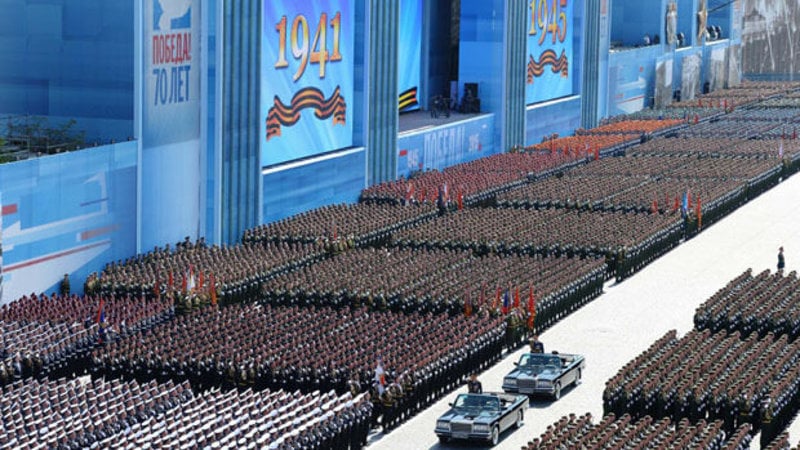![Russia's WWII victory celebrations have become increasingly grandiose and ostentatious [GovernmentZA/Flickr]](http://www.stopfake.org/content/uploads/2016/06/Russia_victory_day_parade_military_CREDITGovernmentZA_Flickr.jpg)
Each year, Russia’s WWII victory celebrations become more grandiose and spectacular. In recent years, the cult of the Great Victory has become a quasi-religion and the main basis which unites the Russian society, writes Oleksii Polegkyi for EurActiv.
The Soviet Union’s victory in WWII became a cornerstone in the process of building a Russian national identity, especially under the rule of Vladimir Putin. It is actively exploited to mobilise support for Kremlin’s current political regime. The heritage of victory in WWII is the basis upon which Russia represents itself as a great power and its reason to claim a special position in Europe.
The cult of the Victory in the ‘Great Patriotic War’ was born in the Soviet Union in the era of Brezhnev’s rule. 9 May – Victory Day – was not even a day off before 1965. The victory in the Great Patriotic War was used to legitimise the communist system in the Soviet Union.
Since the collapse of the USSR, Russia has used the concept of the Great Patriotic War to hold together the post-Soviet space. Putin’s regime in Russia now actively exploits the heritage of common memory shared by former Soviet Union citizens. On the one hand, it allows neighbouring countries to revel in their ownership of the victory in the war, and on the other, Russia keeps its status as the main ‘defeater’ of fascism.
Nowadays the Russian narratives about the Great Patriotic War are based on the three central myths of power, suffering and liberation.
The myth of power
The myth of power is a basis upon which to represent Russia and its leaders as powerful actors and to evoke feelings of glory in belonging to a great country. The concept of power is extremely important for the Russian public imagination and help rulers to justify everything they do.
From the very beginning of his rule, Putin has tried to create an image of Russia as a superpower. He began to construct his own version of Russian history, emphasising the need for a “strong hand” to modernise the country and lead it to the status of a superpower.
Among those Russians that regret the collapse of the USSR, the feeling of regret and nostalgia tends to crystallise around that fact that they “no longer feel they belong to a great power”. In a 2012 survey carried out by the Levada-Center, 51% of respondents chose this answer. In 1999 the figure was just 29%.
The myth of suffering
Suffering is another side to Russia’s myths of power, and is also a constitutive element of the myth of the Great Patriotic War. The myth of suffering implicitly justifies the needs of the victims.
The main arguments those who defend Stalin in Russia is that he won the war and rebuilt a great country, and this would have been impossible to achieve without victims. During recent years, the number of people who believe that his repression was politically necessary and historically justified has significantly increased, while the number of those who think Stalin’s repression constitutes an unjustifiable political crime has fallen.
For a majority of Russians, the most important factor in evaluating Stalin’s historical role is that under his leadership, Russia was victorious in World War II. According to surveys of Russian sociological institutions held by the Levada-Center in December 2015, 28% of respondents said they believed the Stalinist period brought Russia “more good than bad”, 45% said it was equally good and bad, and only 16% answered that it his rule brought “more bad than good”.
The myth of liberation
Since the beginning of this century, Russia’s increased desire to play a greater role in international politics led the country’s political elite to use the ‘symbolic’ capital of the victory over the Nazis in 1945 to strengthen Russia’s position in Europe and to restore control over the ‘near abroad’.
Over recent years, Russian politicians have tried to whitewash the Molotov-Ribbentrop Pact of 1939 which divided Eastern Europe into two spheres of influence between Nazi Germany and Soviet Union. Soviet, and later Russian historiography tried to skip over or justify this Soviet-German cooperation.
In 2014 only 19% of Russians knew that in September 1939 the Red Army invaded Poland (21% in 2010). 63% said this had never happened (56% in 2010). The Russian population are also unaware that the Soviet Union was an aggressive and expansionist state. Only 20% answered “yes” and 53% “no” to the question: “Can we say that in 1940, before the Great Patriotic War, the Soviet Union occupied the Baltic States?”
Russian propaganda has actively used Soviet mythology and the narratives of the Cold War to frame the current events in Ukraine. Vladimir Putin has justified the occupation of Crimea as a need to protect Russians from neo-Nazis and anti-Semites. “What worries us the most? We see the rampancy of neo-Nazis, nationalists, anti-Semites in some parts of Ukraine, including Kiev,” he told journalists on 4 March 2014.
Victory in the Great Patriotic War has today become a founding myth of the Russian nation. Searching the past for a mythological basis upon which to unify the nation, especially in light of the trauma and disappointment associated with the collapse of the Soviet Union, was absolutely logical. The idealisation of the Soviet past, which identifies with the figures of Stalin and Brezhnev, became the answer to the mass frustration of the 1990s. And victory in the Great Patriotic War has for the majority of Russians become almost the only historical event of which they can be proud.
By Oleksii Polegkyi, EurActiv
Oleksii Polegkyi is a PhD researcher at the Institute of International Studies, University of Wroclaw, Poland and the University of Antwerp.





